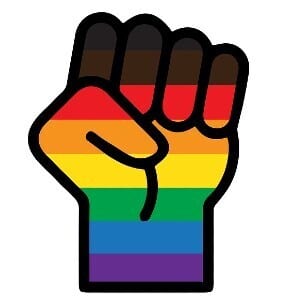
People’s Health Trust recognise that many people with shared identities, experiences, characteristics or common interests face additional barriers to good health due to discrimination and inequality. Intersectionality refers to the interconnected nature of social catagorisations such as race, ethnicity, class, background and gender. Often our funded partners support people facing multiple types of discrimination which requires them to look at the intersectional nature of inequalities.
Pride month in June is a time to reflect on the discrimination faced by LGBTQ+ people (individuals identifying as lesbian, gay, bisexual, transgender, queer/ questioning or a sexual identity outside of this) but it is important to recognise that discriminations and inequalities exist within this community. According to a 2018 report by Stonewall, 51 per cent of Black, Asian and minority ethnic people faced discrimination within the LGBT+ community. Only by recognising and exploring these inequalities can they be tackled and support services be made more accessible.
Support U is an LGBTQ+ support service which is funded through People’s Health Trust’s Active Communities programme. The organisation provides a safe environment to build connections with others in similar circumstances, for a community which can face social isolation and segregation by their peers, family and friends.
Support U recognised a need to engage with lesser-represented members of the LGBTQ+ community. It became apparent that people of colour and refugees and asylum seekers were not accessing Support U’s services and that minimal representation existed in staff and volunteers.
As a result of these concerns, a Cultural Engagement Officer joined the organisation to collect data and help combat the issues. Support U have produced a report exploring how they can better engage with underrepresented groups.
A survey which formed part of the report revealed that when it comes to support services available for LGBTQ+ people of colour and refugee and asylum seeker in the area the project operates, words like “shocking” “minimal” and “non-existent” were used.
When asked why they felt these communities were not engaging with Support U more, many participants cited lack of awareness, language barriers and cultural beliefs as well as fear, and the lack of diversity within Support U.
One anonymous respondent said:
“In my opinion, there are questions of feeling safe in certain spaces that represent intersectionality. My brother is gay and Muslim. In LGBT spaces he is too Asian and in BAME spaces he is too gay. There is a lack of spaces for intersectional groups. No sense of belonging.”
In terms of ways Support U can better help LGBTQ+ people of colour and refugees and asylum seekers, diversifying staff and volunteers was the main topic of discussion. Additional support needs such as counsellors that are people of colour and/or specialists in working with refugees and asylum seekers were also popular requests.
Support U projects exist to promote social inclusion and integration and aim to stamp out homophobia through holistic support, advice and guidance and the removal of perceptive barriers and stereotypes which cause isolation and segregation of LGBTQ+ People in the Thames Valley. Participants drive the agenda, shape the sessions, and provide regular feedback through a range of mechanisms.
This survey highlights the projects enthusiasm to engage with intersectional issues and listen to the needs and experiences of the people they aim to support. The report recommends that this important first step is built upon with further discussions of diversity and representation, reaching out to refugees, asylum seekers and people of colour, and engaging with these communities with relevant social media posts and events.
Support U have acknowledged that more research needs to be done into the issue and that only through a long-term process will trust be built within these communities.
Monique Boucaud, Cultural Engagement Officer, Support U said:
“My position at Support U came from the realisation that something had to be done about the lack of engagement with our services, from LGBTQ+ People of Colour, Refugees and Asylum Seekers. We felt it was important to do some initial research to figure out how we begin to better support and represent these members of our community. As a British-Caribbean lesbian this project is very personal to me. If it wasn’t for the LGBTQ+ PoC spaces that I frequented whilst growing up in London, I would not have been able to safely and comfortably navigate the intersectionality of my race and sexuality.
Support U hopes to increase visibility and support for People of Colour, Refugees and Asylum Seekers by diversifying our staff and volunteers, creating social groups and showcasing art and activism, all whilst continuing to reach out through social media and our campaigns.”
Support U are funded through People's Health Trust's Active Communities programme using money raised by Health Lottery London West.
